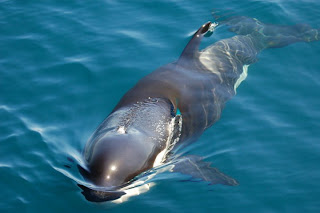Up until a year ago, the only dolphins I had encountered were ones in marine parks such as SeaWorld, and like many others, I (shamefully) thought there was nothing wrong with the life of these performing dolphins and orcas (killer whales). In January 2011, I travelled to the other side of the world to work as a research assistant volunteer to a PhD student studying the common dolphins in the Bay of Plenty, New Zealand. I have to say it was the best thing I've ever done - I fell in love with the country, the research work, and observing these incredible animals on a daily basis. There is something truly unforgettable about seeing these common dolphins (and the other abundant sea life) play and interact in the wild, the way they interact with each other and us on the boats, and that is something you do not get from sitting and watching trained dolphins performing tricks in the pools of marine parks. I was out on a daily basis, spotting these dolphins and tracking them for hours, and the range and variety of behaviours and activities I witnessed was fascinating - and it was all on their terms, if they didn't want to be near us, they didn't have to be. No day was ever the same, and each time we came across a pod of dolphins I would be just as stunned and excited as the first day I saw them in the Bay of Plenty waters. From pods of a couple of adult dolphins to maternity pods of up to 300 dolphins, every encounter was breathtaking and an eye opener to why it is unacceptable to capture and keep these incredible, and potentially highly intelligent, mammals in captivity for public display or for them to be caught and slaughtered.
 |
| Common dolphins (Delphinus delphis) |
 |
| Orca (Orcinus orca) |
Since coming back to the UK and back to university to complete my Zoology degree, I have become increasingly interested in the issue of keeping cetaceans in captivity for the purpose of public entertainment. There is a growing volume of studies and evidence promoting the fact that cetaceans have a high level of intelligence, which is causing major ethical issues to arise concerning the capture, confinement and slaughter of these animals. They are highly social mammals, with complex social structures and exhibit cultural and cognitive abilities that are similar to us humans. I believe there is a strong case against marine mammal captivity and the slaughter of these animals. Since having the fantastic opportunity of experiencing these animals in the wild, and as many of my friends hear everyday, I want to help raise awareness of major problems with keeping these animals in captivity and spread the increasing amounts of evidence proving these cetaceans to be highly intelligent animals.
Marine parks promote an educational and conservation advantage to having whales and dolphins in captivity, but in reality what are the public learning? That it's okay to keep these large mammals in tanks that are minute in comparison to their natural habitat? That these animals are easily trained and are very acrobatic? That because they always appear to be smiling, they're enjoying having to perform these tricks in order to get some dead fish? These animals are wide-ranging mammals, who can travel huge distances in a day, who develop and master hunting strategies for chasing and capturing their live prey and who do not need to rely on performing conditioned behaviours to get some food. The smiling expression of a dolphin creates the illusion that these animals are happy being confined to a life of public performance, but this confinement has devastating effects of the health and survival of cetaceans. I appreciate the efforts marine park companies go to when, for example, helping the rescue of beached whales or dolphins, and the release of animals back into the wild, and this is what should be the main focus of their marine parks - the rescue, rehabilitation and release (wherever and whenever possible) of marine mammals back to their ocean, its where they belong and where you will get the best, and most memorable, experience of seeing them (I promise!).
Follow on Twitter for up to date news on the status of marine mammal captivity - @nicshaw08
No comments:
Post a Comment